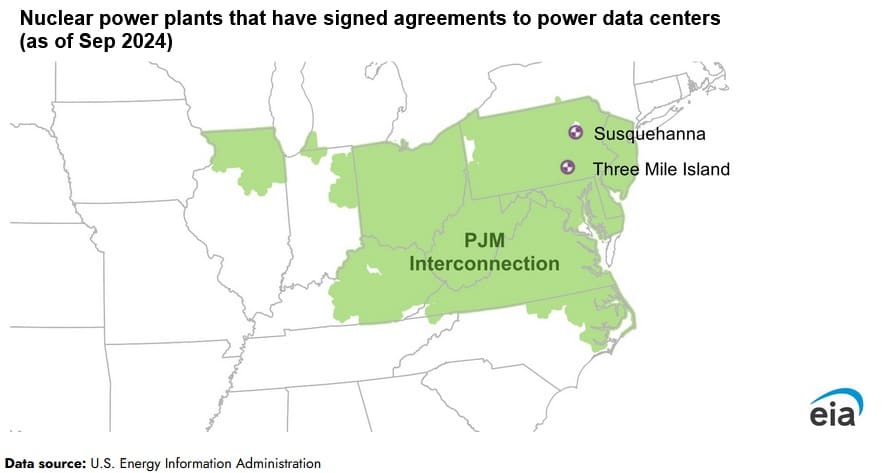Data Centers Turn to Nuclear Plants for Emission-Free Power: EIA

Recent power purchase agreements between nuclear plant owners and data centers highlight data center operators’ efforts to secure emissions-free power, but future electricity demand is subject to uncertainties, according to an Oct. 1 report from the U.S. Energy Information Administration. Factors such as the size of new data center capacity, the time required for each facility to reach peak demand, and advancements in energy efficiency as technology and design evolve will all influence demand growth.
Constellation Energy on Sept.20 announced the signing of a 20-year power purchase agreement to provide electricity to Microsoft data centers in the mid-Atlantic region. The nuclear energy will come from the Unit 1 reactor at the Three Mile Island plant in Pennsylvania. The unit 1 reactor was retired in 2019 due to it becoming uneconomical to operate, however under the latest announcement the reactor is expected to restart in 2028 and operate at full capacity for at least 20 years.
The agreement between Constellation Energy and Microsoft is the second deal signed this year, in which a nuclear power plant has agreed to supply a data center with dedicated electricity, with data center owners seeking reliable sources of power supply for projected increases in demand. Earlier this year, Amazon Web Services signed a contract for 960 megawatts (MW) of capacity from Talen Energy’s Susquehanna nuclear power plant in Pennsylvania.
Data center consumption has been one of the major drivers behind the recent growth in electricity demand due to digitalization and data-driven technologies. Data center power consumption is projected to increase from about 19 gigawatts (GW) in 2023 to about 21 GW this year. Nationwide, data center demand is anticipated to reach 35 GW by 2030, up from 17 GW in 2022. Forecasts for future electricity demand from data centers remains uncertain due to a number of factors and as result, requests for power capacity by data centers owners do not necessitate the owner to use the full capacity.
Nuclear is an ideal energy source for data centers due to nuclear power plants producing electricity at relatively low operating costs. Moreover, nuclear power plants generate electricity without directly releasing carbon dioxide, an important feature for technology businesses investing in data centers that are aiming to fulfil emission reduction targets.
Furthermore, data electricity consumption is flat throughout the day and doesn’t fluctuate like demand in households and businesses does. As a result, nuclear production, which is usually baseload, fulfils the demand shape requirements of data centers.
EnerKnol Pulses like this one are powered by the EnerKnol Platform—the first comprehensive database for real-time energy policy tracking. Sign up for a free trial below for access to key regulatory data and deep industry insights across the energy spectrum.
ACCESS FREE TRIAL